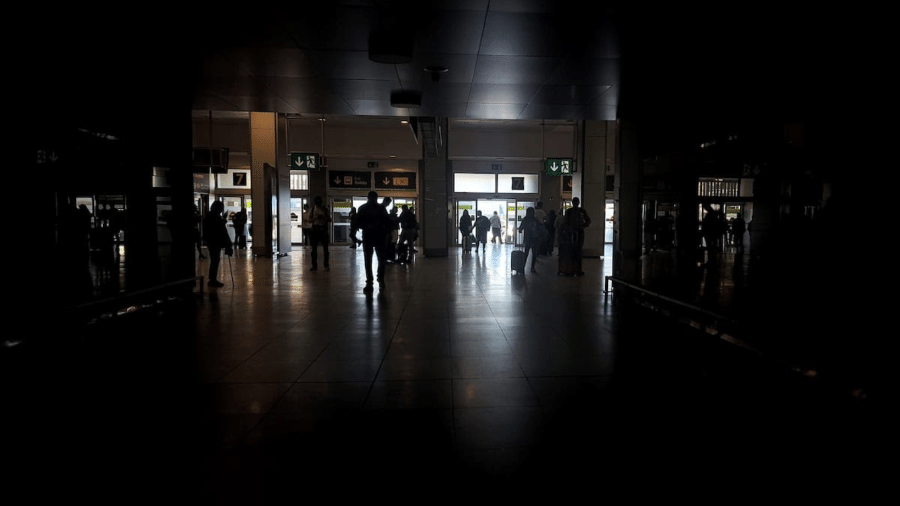Adverts
On the day that a sudden blackout enveloped Spain and Portugal in a blanket of darkness, theories about its causes began to swirl. What could have caused such a disruption to the daily lives of millions of people? While many speculated about technical failures, others pointed to natural events or even coordinated actions.
In this content, we will reveal the behind the scenes of this phenomenon that shook the Iberian Peninsula, revealing facts and information that you have not yet seen.
Adverts
The analysis of the blackout that paralyzed two nations goes beyond simplistic explanations. Let's dive into the technical and geopolitical details that may have contributed to this massive power outage.
Is the country’s electrical infrastructure prepared to face the challenges of the 21st century? And what about the economic and social implications of this event? By exploring the causes and effects of this blackout, we will highlight potential vulnerabilities and lessons learned.
Adverts
With a critical and investigative view, we seek answers to the questions that remain in the air. What really happened on that fateful night? How did the authorities respond to this crisis?
Get ready for an informative journey that promises to enlighten and surprise, as we unravel the mysteries behind the major power outage in Spain and Portugal. 🌍💡

The Impact of the Power Cut in the Iberian Peninsula
When the power goes out in an entire region, the first reaction is panic. The power outage that affected Spain and Portugal was an event that left millions of people in the dark, literally. This blackout brought a series of challenges, from the interruption of essential services to chaos in urban traffic. 🏙️
Recommended Articles:
As citizens struggled with power outages in their homes, businesses and utilities rushed to activate their emergency generators. Traffic was at a standstill on the streets, with traffic lights out and drivers struggling to navigate the chaos. Trains were also impacted, causing massive delays and cancellations. 📉
The scale of the problem was such that governments in both countries had to issue statements to calm the population and initiate contingency measures. However, what initially seemed like a simple technical problem soon turned out to be a more complex puzzle, requiring an in-depth investigation into the causes and failures that led to this energy collapse.
The Primary Causes: What We Know So Far
The massive power outage has left many wondering: what actually caused the blackout? There are several theories, but preliminary data points to a series of concatenated failures. One early hypothesis suggests that an overload on the power grid may have been the starting point, triggering a domino effect on adjacent infrastructure. ⚡
Furthermore, failures in the power grid’s safety and control systems contributed to the spread of the problem. Under normal circumstances, these systems should isolate faults and prevent them from spreading, but in this case, it appears that these safety barriers have failed. 🛡️
Experts also do not rule out the possibility of a cyberattack, especially considering the increase in incidents of this type on critical infrastructure around the world. This possibility is being investigated, although there is no concrete evidence to suggest this yet.
Technical Challenges: The Infrastructure Conundrum
The electrical infrastructure in the Iberian Peninsula is complex and interconnected, which can be both an advantage and a disadvantage. Interconnection allows for the exchange of energy between countries, which is essential for stability, but it also means that a problem in one part of the system can quickly spread to other areas. 🔗
Technical challenges include managing a system that must meet increasing energy demands, especially during peak usage. In addition, aging infrastructure in some regions may have contributed to the vulnerability that resulted in the blackout. 🏗️
Preventative maintenance and technology upgrades are essential to avoid future problems. However, implementing such measures requires significant investment and long-term strategic planning, something that is not always easy to achieve in times of budgetary constraints.
The Role of Governments and Energy Companies
The governments of Spain and Portugal are now under pressure to explain how an event of this magnitude could have occurred. Responsibility lies with the energy companies, but also with the public policies governing the electricity infrastructure. Initial investigations are focused on understanding whether there were failures in the supervision and regulation of the sector. 🏛️
As investigations continue, governments are being held accountable for greater transparency and communication with the public. Many citizens felt left in the dark, literally and figuratively, without clear information about what was happening. 📢
Energy companies, on the other hand, are facing criticism over their management of operations and emergency response capabilities. It is clear that a concerted effort is needed to ensure that the security and resilience of the power grid is improved.
Economic and Social Impacts of the Blackout
The blackout had significant economic repercussions, affecting a wide range of sectors. From small businesses to large industries, many faced financial losses due to the shutdown of activities. 🏢
In addition to the economic impact, the blackout also had social consequences. The interruption of basic services such as hospitals, transport systems and communications caused discomfort and, in some cases, put lives at risk. 🏥
The event highlighted the need for more robust backup systems and contingency plans that can be activated quickly. The lessons learned from this incident will be crucial to preventing similar disasters in the future and ensuring that critical infrastructure is more resilient.
Future Measures: Learning from the Crisis
Following the blackout, it is clear that measures need to be taken to prevent similar events from occurring again. Some of the proposed solutions include:
- Investing in smart grid technologies to improve fault detection and response.
- Improve international cooperation between power grids to ensure that support can be provided quickly in emergencies.
- Review and update security regulations to ensure they are adequate to address modern threats.
- Increase incident response capability through regular training and simulations.
The lessons learned from this incident can serve as a catalyst for a positive transformation in the way electricity grids are managed. The path forward will be crucial to ensuring a future where large-scale power outages are a rarity, rather than an imminent possibility.
Conclusion
The recent massive power outage in Spain and Portugal has sparked a wave of speculation and theories. What really happened? After a thorough analysis of the events, it is possible to conclude that this blackout was not a simple accident. Initially, technical problems in the power grid were pointed out as the cause. However, as investigations progressed, evidence emerged that cybersecurity failures also played a significant role. This event highlighted the vulnerability of critical infrastructures to cyberattacks, something that authorities must take seriously. Furthermore, it is crucial to recognize the interdependence between the energy systems of Spain and Portugal. This incident served as a wake-up call on the need to strengthen cooperation between the two countries to ensure the resilience of the Iberian power grid. Therefore, while the immediate cause of the blackout may have been a combination of technical and security failures, the long-term solution lies in strengthening the infrastructure and international collaboration. 💡 Therefore, the governments of both countries must act quickly to implement effective preventive measures, ensuring that similar events do not occur again. Energy security is vital for the economic and social stability of the region, making these actions an urgent priority.



